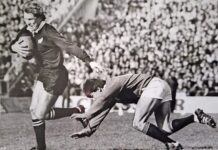Long-time media commentator – and one-time Gulf News editor – Tom Frewen comments on the changing face of the world’s media
Nobody predicted, as far I know, that the end times would be so entertaining. Wars and rumours of wars, check; famines, pestilences and earthquakes, check; false prophets, tribulations, abominations, check, check, check. No mention, though, of Donald Trump or Patrick Gower.
Trump is no mystery to me. He is a natural, organic product of American popular culture: its comics, movies and, above all, its television. With a lineage going back to Popeye, Tom and Jerry, Mickey Mouse and Donald the First, Trump is a Disney creation in an economy where turning reality into fantasy is a huge, multi-billion dollar industry.
The biggest aberration in contemporary American politics is not Trump but Obama, who is as intelligent, refined and sophisticated as his potential successor is dumb, boorish and vulgar. In television terms, they are Masterpiece Theatre v All New Beach Cops. But when it comes to television ratings, trash trumps art every time.
McLuhan said: the medium is the message. Frewen says: the message is the money.
Medium, message and money come together on television for the US presidential elections. As seen on television, polling day is the signal to start the next campaign.
Moving pictures demand movement. That might seem a no-brainer. But politicians have few moving parts, mainly just arms and lips. This is a challenge for all political reporters but especially those working in television. They have come to rely on the analogies of the race and the battle to provide them with a steady supply of winners and losers to keep breaking news breaking.
With elections inconveniently scheduled up to five years apart, political polls provide regular updates for commentary on progress of the race/battle and its possible outcomes. Although they’d get better odds on picking the first five runners in the next Melbourne Cup, they persist in speculating on the composition of the next multi-party government to be produced by our complicated MMP system, from up to three years out from polling day to the counting of votes on the night – when it’s always “early days” and too close to call.
Political commentary is now almost exclusively about the result of the next election. The focus on the fortunes of political parties and their leaders overshadows the sporadic reporting of what goes on in Parliament, which is the physical result of the last election expressed in the numbers of bums on seats in the House of Representatives.
Races with just the two horses, a hare and a tortoise or battles between a David and a Goliath are preferred. Presidential contests are easier to cover. Television studios can’t accommodate debates with lines of candidates out the door and down the corridor.
The third series of Borgen, the Danish political television drama, has a sub-plot which addresses the problem of staging televised debates in an election contested by eight parties. One channel sets out to win the ratings battle by “inventing a demand” for a presidential-style, one-on-one debate.
Our mainstream commercial television channels have no room for Borgen, with its complicated plots and sub-titles. That is unfortunate because our electoral system is European and this boxset drama about Danish politics and media, and their relationship to each other, could be about us. It should be shown in schools.
Sadly, we lack the talent and skills to make our own Borgen.
We do have Patrick Gower. Like Donald Trump, TV3’s political editor is a creature of television. It is his medium and he should never leave it.
Gower, who is in the United States covering the presidential primaries, appeared together with Trump in last weekend’s Sunday Star-Times in a bonus fantasy double feature. “‘The Donald’ tackles the hard questions,” Gower reports, without revealing the hard question that got Trump to say “I love Bob Charles.” Is it possible that Mediaworks, reportedly cash-strapped and laying off journalists by the shift load, sent their political editor all the way across the Pacific to ask a candidate in the race for the Republican Party nomination in the 2016 presidential election campaign if he loved Bob Charles?
I caught Gower earlier on the news asking Trump what he thought of the TPP. Gower addressed his question to the candidate’s back as Trump and his comb-over walked briskly away from him. That might have been a hard question for Trump. He has big gaps in the general knowledge space, whereas he does play golf and owns several courses so could know about New Zealand golfing greats.
Trump and Gower have the same vaguely puzzled expression, as if they can’t quite believe or fully understand whatever it was they just said. On television, however, actions — hair in Trump’s case and teeth in Gower’s — speak louder than words. But in print or on the radio they make as much sense as dogs barking in the night. Woof! •







